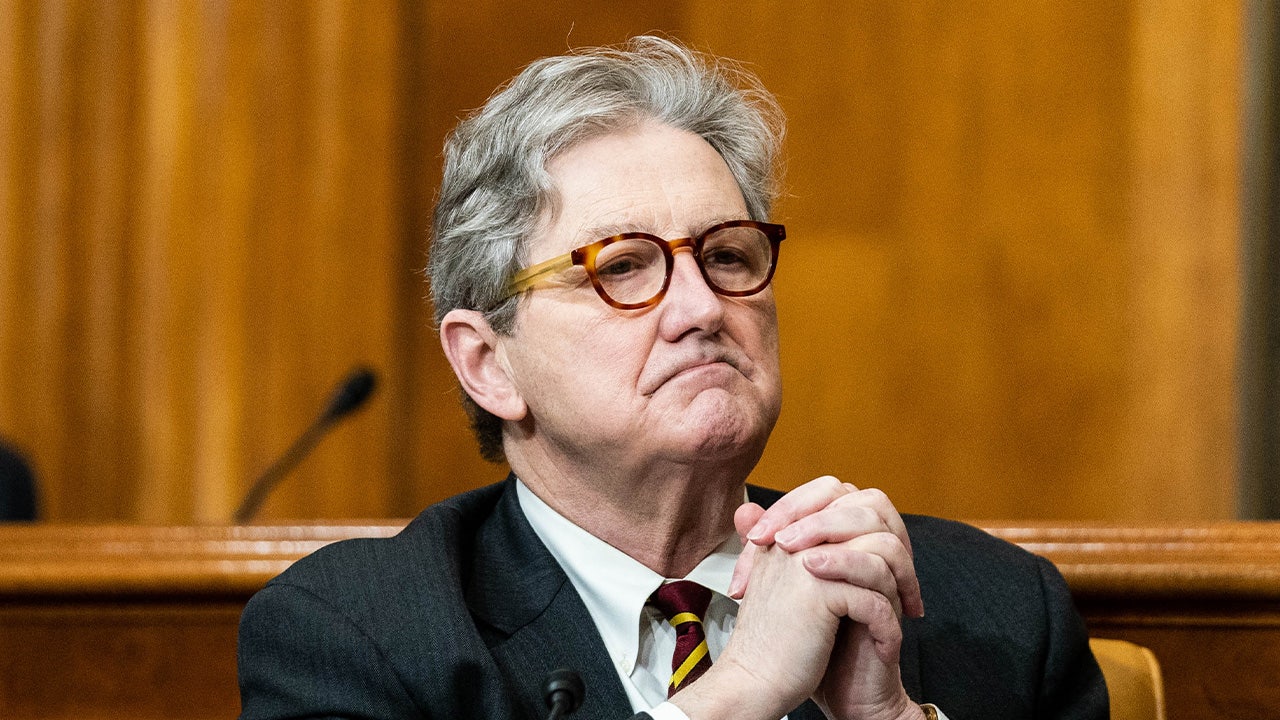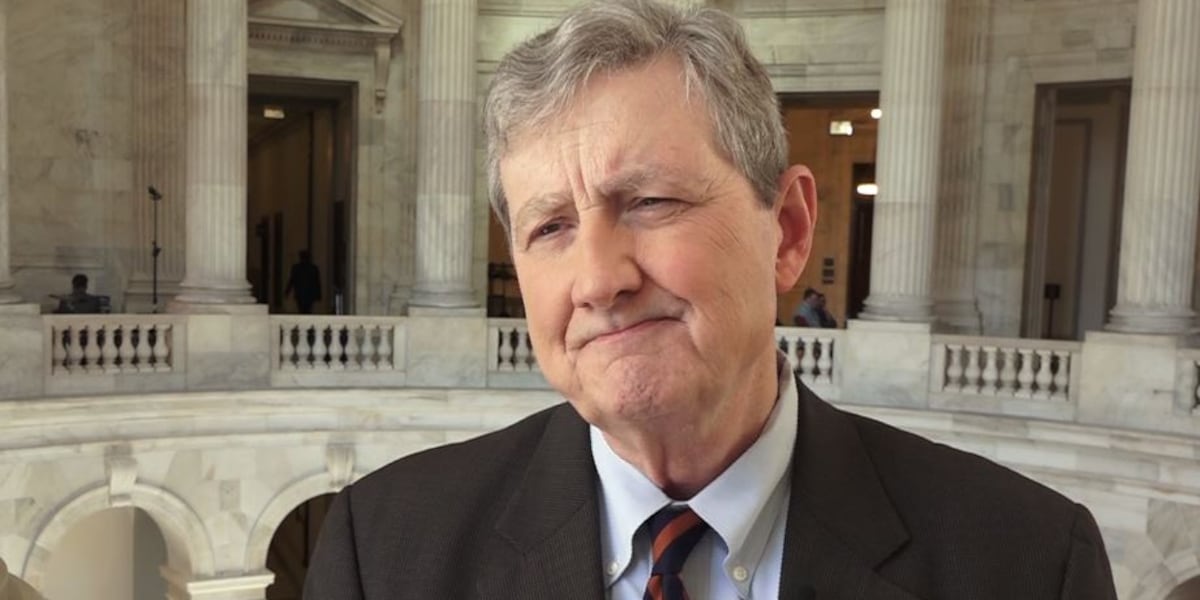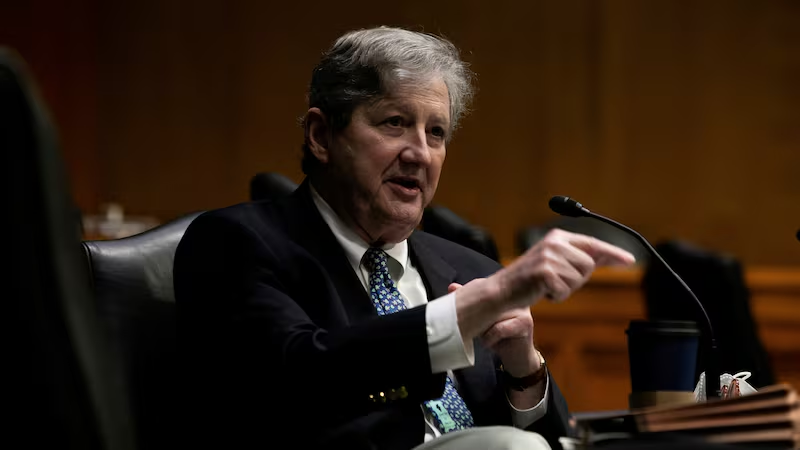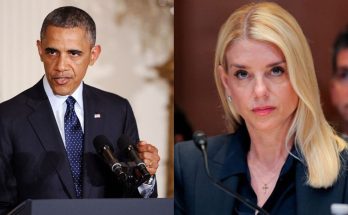AOC Said, ‘You Needs to Be Silenced’ — Sen. Kennedy Read the Whole Thread Out Loud
It started with a tweet.
A few sharp words, tossed into the digital void by Representative Alana Cortez — words that would ignite one of the most unforgettable nights in political history.
“Senator Kellan,” she wrote, “represents a danger to democracy. Someone like him needs to be silenced before his words cause real damage.”
The post wasn’t unusual in tone — fiery exchanges were common between these two ideological opposites — but this one had weight. It came on the eve of a nationally televised policy forum, and the timing was perfect for outrage.
Except, no one expected how Senator J. Kellan would respond.
The Tweet Heard Across Washington
By sunrise, the tweet had already gone viral.
Cable news anchors debated whether Cortez had gone too far, commentators dissected every syllable, and hashtags filled the screens:
#SilenceKellan #FreedomUnderFire #TheThreadThatShookDC
The morning after, Kellan walked into his office with his trademark calm. He didn’t call a press conference. He didn’t post a rebuttal. Instead, he quietly printed out every single tweet from Cortez’s account — not just the controversial one, but the entire thread that followed.
A staffer recalled seeing him slip the papers into a simple manila folder. “He looked like he was preparing for a court case,” the staffer said. “But there was something different in his eyes. He wasn’t angry. He looked… resolved.”
The Forum That Changed Everything
The national policy forum was supposed to be routine — a conversation about public discourse, free speech, and civic responsibility. Cameras were ready. Seats were filled. And both sides knew sparks might fly.
Rep. Cortez entered first, confident and radiant under the stage lights. She waved to the crowd, already playing to her base.
Then, Senator Kellan appeared — no notes, no teleprompter, just that quiet Southern composure he was known for.
The moderator began with pleasantries, then asked the question everyone was waiting for:
“Senator Kellan, earlier this week, Representative Cortez accused you of being a threat to democracy. How do you respond?”
For a brief moment, the room was still.
Then, Kellan reached into his folder.
“I’ll Let Her Speak for Herself”
“I appreciate the question,” Kellan said, voice steady, eyes fixed on the audience rather than his opponent. “But I don’t think I need to respond in my own words.”
He held up the printed pages. “Instead, I’ll let Representative Cortez speak for herself.”
The moderator blinked, unsure what he meant — until Kellan began to read.
Line by line. Word by word. Every tweet, every insult, every accusation. No edits. No interruptions. Just a calm, deliberate recitation of her own words projected on national television.
As he read, the atmosphere changed.
What began as amusement slowly turned to discomfort. The audience started shifting in their seats. Even the moderator seemed uneasy.
“‘You need to be silenced.’”
Kellan read it slowly, letting the words hang in the air. “I don’t believe silence ever built a democracy,” he said quietly, “but I do believe free speech has saved one.”
The Turning Point
Cortez’s expression faltered.
At first, she smiled dismissively, but when Kellan continued reading — citing her own posts about censorship, control, and selective outrage — the smile faded.
Behind the cameras, aides were whispering frantically. Producers debated whether to cut to commercial.
But Kellan wasn’t done.
He flipped to another page.
“This one,” he said, “was posted two hours after the original tweet: ‘He hides behind the First Amendment to protect hate.’”
He paused. “I don’t hide behind the First Amendment. I stand on it.”
The audience erupted in applause — not from partisanship, but from something deeper: recognition of courage.
For seven full seconds, no one spoke. The sound of the applause faded into an eerie silence — the kind that says,
something irreversible just happened.

The Aftermath Inside the Chamber
When the forum ended, reporters swarmed the hallway.
Cortez slipped out through a side exit. Kellan stayed behind, answering every question, never raising his voice once.
One journalist asked, “Senator, were you trying to humiliate her?”
He replied, “No, ma’am. I was trying to remind her — and all of us — that speech is not the enemy of freedom. Silence is.”
Those words were replayed on every major network that night.
Clips went viral, hashtags flipped, and within 24 hours, the narrative had completely changed.
#StandWithKellan replaced #SilenceKellan.
Even prominent figures who normally opposed him admitted the moment was powerful.
“This wasn’t a takedown,” one commentator said. “It was a civics lesson broadcast live.”

Inside the Offices — Private Fallout
Behind the scenes, chaos reigned.
Staffers in Cortez’s office scrambled to manage the blowback. Internal messages leaked — some suggesting they hadn’t expected Kellan to show up so prepared.
“He was supposed to take the bait,” one aide wrote. “We were ready to paint him as angry and unhinged. But he didn’t play our script.”
Meanwhile, Kellan’s team was flooded with messages — some congratulatory, others warning him that he had “shaken the establishment too hard.”
But Kellan reportedly told his aides something that became the quote of the week:
“If speaking truthfully shakes the system, then maybe the system needs to be shaken.”
The Clip That Went Global
The seven-minute clip of Kellan reading the tweets was uploaded online by a journalist. Within hours, it crossed 10 million views.
By the next day: 50 million.
By the weekend: over 120 million.
The internet had turned the moment into a cultural event.
Memes flooded social media — half mocking Cortez, half praising Kellan.
Celebrities weighed in. Podcasters dissected every second.
But what fascinated viewers most wasn’t what Kellan said — it was
how he said it.
He didn’t insult. He didn’t gloat. He just read.
And that calmness — that refusal to meet fury with fury — made the confrontation unforgettable.
Beyond Politics — The Larger Message
In the days that followed, Kellan released a short statement from his Senate office:
“Freedom of speech isn’t about who speaks loudest — it’s about who listens longest. I didn’t read those tweets to embarrass anyone. I read them to remind America that disagreement doesn’t mean danger.”
That single quote became the backbone of hundreds of op-eds.
Commentators on both sides — liberal, conservative, and independent — found themselves debating something rare: substance.
Was Kellan right?
Had public discourse truly devolved to the point where opposing views were labeled “dangerous”?
One editorial wrote: “Whether you agree with him or not, Senator Kellan just forced America to confront the uncomfortable truth — that we’re more afraid of each other’s voices than of losing our own.”

The Hidden Thread — Why It Mattered
What few knew at the time was that Kellan and Cortez had once shared a working friendship.
Before politics became polarized, they’d collaborated on a bipartisan education initiative.
Kellan had even publicly praised her passion years earlier, saying, “She’s wrong about many things, but never wrong about caring.”
So when he read her tweets aloud, it wasn’t revenge — it was disappointment.
Those close to Kellan said he viewed the moment as “a mirror” for the entire country — not a fight, but a reflection.
“He wanted people to hear their own anger,” one aide said. “To realize how far we’ve drifted from conversation into condemnation.”
The Night After
That evening, while cable news hosts argued, a cellphone video surfaced.
It showed Senator Kellan sitting alone in a diner, still in his suit, quietly reading a book — The Federalist Papers.
The caption read: “This is what calm looks like after a storm.”
The image went viral overnight. It wasn’t the image of a conqueror, but of a man who had simply done what he believed was right.
The Congressional Ripple Effect
The following week, both chambers of Congress debated a new proposal on online speech accountability.
Kellan’s speech was cited more than 40 times during discussions.
Even his critics admitted the viral moment had reshaped the tone of national debate.
Instead of yelling matches, lawmakers began invoking Kellan’s phrase: “Listen longer.”
It became something of a slogan — printed on posters, coffee mugs, and social media banners.
A moment born from confrontation had somehow evolved into a movement for restraint.

Rep. Cortez’s Response
Three days later, Alana Cortez broke her silence.
In a televised interview, she admitted, “Maybe I was too harsh. Maybe I should’ve chosen different words.”
It wasn’t a full apology, but it was close enough to surprise her critics.
When asked about Kellan’s reading of her tweets, she smiled slightly and said, “He made his point. Loud and clear.”
That clip, too, went viral — though not for the reasons she expected.
Viewers saw it as a rare glimpse of humility in modern politics.
What the Public Remembered
Months later, polls showed an unusual result.
Voters from both parties named Senator Kellan’s forum speech as “the most memorable political moment of the year.”
Not because it changed laws or policies — but because it reminded them of something deeper: decency.
In an era of viral outrage, Kellan had proven that composure could go viral too.
The Legacy of “The Reading”
Today, journalists still refer to that moment as The Reading.
Universities have used it as a case study in communication and rhetoric.
It became a metaphor — for leadership that listens, for conviction without cruelty, and for courage that doesn’t need volume to be heard.
When asked years later why he did it, Senator Kellan gave a simple answer:
“Because I wanted people to remember what real debate sounds like. You can’t find truth in silence — only in speech.”
The Thread That Started It All
The original tweet is long gone — deleted within hours after the broadcast.
But screenshots remain, and so does the lesson.
Every word once meant to silence a voice ended up amplifying a message.
And for millions watching that night, something shifted.
Politics briefly looked less like a battlefield… and more like a classroom — where one calm man, armed only with paper and principle, taught an unforgettable lesson on freedom.
Final Reflection
The moment Senator J. Kellan read those words aloud wasn’t just about him or his opponent.
It was about a nation that had forgotten how to hear itself.
When he said, “I don’t hide behind the First Amendment — I stand on it,” the applause that followed wasn’t just approval.
It was relief.
Relief that somewhere, amid all the noise, courage still speaks — softly, firmly, and freely.





